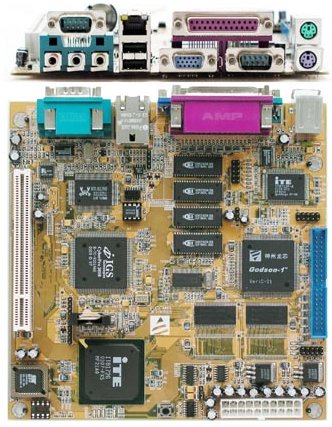China targets world chip market, but could face licensing trouble
Jul 25, 2005 — by Henry Kingman — from the LinuxDevices Archive — viewsA Chinese semiconductor company has demonstrated the technical capability to produce world-class microprocessors, according to In-Stat's Microprocessor Report. However, BLX IC could face intellectual property disputes if its new Godson-2 (Dragon) embedded processor or products based on it reach the US.
According to a ten-page article available to Microprocessor Report subscribers, the Godson-2 is “about 95 percent MIPS-compatible.” Additionally, BLX has apparently marketed the architecture as “MIPS-like,” to the annoyance of MIPS Technologies, which doesn't authorize the Godson architecture, and has not licensed any intellectual property to BLX IC Design or to the Institute of Computing Technology (ICT), the university that designed the chip.
BLX has formerly collaborated with MIPS-licensee AMD, however, on a Computing Client Development Center in Beijing. The Center develops thin client systems based on AMD's MIPS32-based Alchemy chips, as well as on BLX's Godson chips.

A Godson-1 based mini-ITX board for thin clients produced by a joint AMD/BLX design center in Beijing
The Microprocessor Report story suggests that China's ability to produce world-class processors may be limited primarily by its manufacturing technology, which it says lags several generations behind. The Godson-2 is manufactured using a 0.18-micron process, at China's Semiconductor Manufacturing International Corporation (SMIC). However, Chinese companies could easily find fabrication partners elsewhere in Asia, the article suggests.
According to Microprocessor Report, ICT is currently working on a Godson-2 die-shrink to 0.13-micron, while also starting work on a Godson-3 chip that could feature multiple cores and hardware-assisted simultaneous multithreading.
According to Microprocessor Report, Chinese processors are likely to reach the world market in consumer-electronics products, an event that could prompt legal action from MIPS — although AMD has reportedly encouraged BLX and MIPS to “settle their differences,” the article suggests.
Potential licensing difficulties notwithstanding, China's ambition to make microprocessors will affect chip makers worldwide, the Microprocessor Report article concludes. The full 10-page story, by Senior Editor Tom Halfhill, is available to subscribers free of charge, and to non-subscribers for $99. It is based on independent analysis, as well as an exclusive interview with Weiwu Hu, the ICT professor who served as Godson's chief architect.
Additional details can be found here. ExtremeTech has also published a story about the report, here.
This article was originally published on LinuxDevices.com and has been donated to the open source community by QuinStreet Inc. Please visit LinuxToday.com for up-to-date news and articles about Linux and open source.